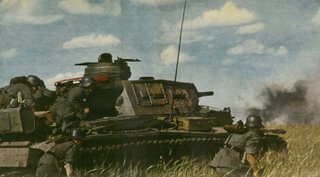
Excerpt from George Orwell, "You and the Atomic Bomb" (1945)
"It is a commonplace that the history of civilisation is largely the history of weapons. In particular, the connection between the discovery of gunpowder and the overthrow of feudalism by the bourgeoisie has been pointed out over and over again. And though I have no doubt exceptions can be brought forward, I think the following rule would be found generally true: that ages in which the dominant weapon is expensive or difficult to make will tend to be ages of despotism, whereas when the dominant weapon is cheap and simple, the common people have a chance. Thus, for example, tanks, battleships and bombing planes are inherently tyrannical weapons, while rifles, muskets, long-bows and hand-grenades are inherently democratic weapons. A complex weapon makes the strong stronger, while a simple weapon--so long as there is no answer to it—gives claws to the weak."
"The great age of democracy and of national self-determination was the age of the musket and the rifle. After the invention of the flintlock, and before the invention of the percussion cap, the musket was a fairly efficient weapon, and at the same time so simple that it could be produced almost anywhere. Its combination of qualities made possible the success of the American and French revolutions, and made a popular insurrection a more serious business than it could be in our own day. After the musket came the breech-loading rifle. This was a comparatively complex thing, but it could still be produced in scores of countries, and it was cheap, easily smuggled and economical of ammunition. Even the most backward nation could always get hold of rifles from one source or another, so that Boers, Bulgars, Abyssinians, Moroccans--even Tibetans--could put up a fight for their independence, sometimes with success. But thereafter every development in military technique has favoured the State as against the individual, and the industrialised country as against the backward one. There are fewer and fewer foci of power. Already, in 1939, there were only five states capable of waging war on the grand scale, and now there are only three—ultimately, perhaps, only two. This trend has been obvious for years, and was pointed out by a few observers even before 1914. The one thing that might reverse it is the discovery of a weapon—or, to put it more broadly, of a method of fighting—not dependent on huge concentrations of industrial plant."

No comments:
Post a Comment